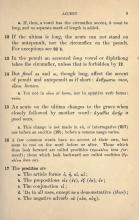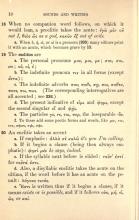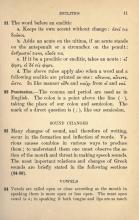16. A few common words have no accent of their own, but seem to rest on the word before or after. Those which thus look forward are called proclitics (προ-κλῑ́νω lean forward); those which look backward are called enclitics (ἐγ- κλῑ́νω lean on).
a. The article forms ὁ, ἡ, οἱ, αἱ;
b. The prepositions εἰς (ἐς), ἐξ (ἐκ), ἐν;
c. The conjunction εἰ;
d. Ὡς in all uses, except as a demonstrative (thus);
e. The negative adverb οὐ (οὐκ, οὐχ).
18. When no companion word follows, on which it wοuld lean, a proclitic takes the acute.
ἐγὼ μὲν οὔ not I
θεὸς ὥς as a god
κακῶν ἔξ out of evils
a. When ὁ, ἡ, οἱ, or αἱ is a pronoun (§ 205) many editors print it with an acute, which becomes grave by § 15.
a. The personal pronouns μου, μοι, με; σου, σοι, σε; οὑ, οἱ, ἑ;
b. The indefinite pronoun τις in all forms (except ἄττα);
c. The indefinite adverbs που, ποθι, πῃ, ποι, ποθεν, ποτε, πω, πως. (The corresponding interrogatives are all accented; see § 236.)
d. The present indicative of εἰμι and φημι, except the second singular εἶ and φῄς.
e. The particles γε, τε, τοι, περ, the inseparable -δε.
f. Tο these add some poetic forms and words, like μιν, νιν, νυν, σφισι, σφι, σφε.
20. An enclitic takes an accent
a. If emphatic.
ἀλλὰ σὲ καλῶ it's you I'm calling
b. If it begins a clause (being then always emphatic).
φησὶ μέν he says, indeed
c. If the syllable next before is elided.
ταῦτʼ ἐστί for ταῦτά ἐστι
d. Also, a disyllabic enclitic takes the acute on the ultima, if the word before it has an acute on the penult.
λόγους τινάς
e. Ἔστι is written thus if it begins a clause, if it means exists or is possible, and if it follows οὐκ, μή, εἰ, ὡς, or καί.
21. The word before an enclitic
a. Keeps its own accent without change.
ἐπεί τις διώκοι
b. Adds an acute on the ultima, if an acute stands on the antepenult or a circumflex on the penult.
ἄνθρωποί τινες
οἶκός τις
c. If it is a proclitic or enclitic, takes an acute.
εἴ φησι
εἰ δέ τίς φησι
d. The above rules apply also when a word and a following enclitic are printed as one.
οὗτινος, αἵτινες, ὥστε
In like manner εἴθε and ναίχι from εἰ and ναί.



